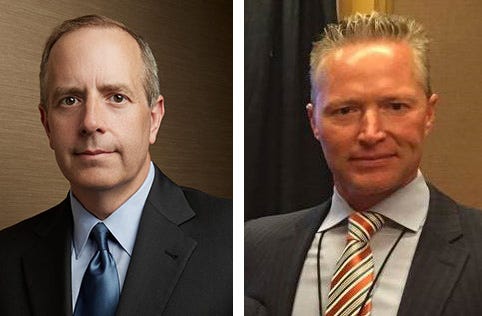When Is Off-Label Promotion a First-Amendment Right?
September 30, 2015
Medtech executives charged in two high-profile criminal cases are making the argument that FDA is squelching their free speech.
Qmed Staff
|
Vascular Solutions CEO Howard Root (left) and Patrick Fabian, currently chief commercial officer at NxThera, are arguing that the First Amendment covers honest and accurate off-label promotion of medical devices. |
At the same time that the U.S. Justice Department is increasingly holding medtech executives personally accountable for the marketing of their companies' products, the executives are responding with an argument straight out of the Constitution: You can't prosecute people for saying things that are true.
A recent article in the Star Tribune of Minneapolis cites First Amendment defense arguments being made in by Vascular Solutions CEO Howard Root, indicted by a federal grand jury in western Texas over off-label use sales promotions. The Star Tribune also mentions a freedom of speech argument being made in U.S. District Court in Massachusetts by former Acclarent sales vice president Patrick Fabian, who along with former CEO William Facteau is accused of fraudulent activities and skirting of FDA rules in the years leading up to the company's 2010 acquisition by Johnson & Johnson. In all, Fabian and Facteau face 18 charges including conspiracy, securities fraud, wire fraud, and introducing adulterated or misbranded medical devices into interstate commerce.
Such First Amendment arguments are being at the same time that the U.S. Justice Department is increasingly going after pharmaceutical and medical device company executives directly, versus seeking fines from their companies, says Paul John Scott in the Post-Bulletin of Rochester, MN, where Mayo Clinic is based.
"Left undecided is who will make the determination that the science promoting a new use of a product is 'truthful and non-misleading.' We ought to create an agency to find out if a study is truthful and non-misleading. Something like, I don't know, the FDA," Scott says.
In both the Acclarent and the Vascular Solutions cases, free speech is being cited as lawyers for the men demand more information about secret grand jury hearings as they raise questions about indictments, saying that prosecutors did not accurately tell grand juries what medical device companies are allowed to tell health providers about their products, according to the Star Tribune.
Vascular Solutions CEO Howard Root is arguing that his company's off-label promotion accurately represents how his company's vein-closure device is used, but acknowledges that the FDA does not necessarily support the claims.
Lawyers for Facteau and Fabian case have argued that the grand jury was not instructed correctly over such medical device regulatory matters as the limitations of the meaning of "intended use," that it is legal to distribute devices knowing that there is possible off-label use, that truthful, non-misleading communications about off-label use are legal, and that medtech companies do not have a duty to report off-label use.
"Misinstruction to the grand jury on any of these critical issues would constitute a serious defect in the grand jury proceedings warranting dismissal," Facteau and Fabian's lawyers write in a July 23 motion for disclosure of the grand jury instructions.
The move by Fabian and Root to argue that free speech pertains to off-label promotion mirrors similar challenges voiced by the pharmaceutical industry. Earlier this year, Pharmaceutical Research and Manufacturers of America and the pharmaceutical coalition known as the Medical Information Working Group filed amicus briefs in New York arguing that FDA's oversight pertaining to off-label promotion should be curbed. Specifically, the groups were involved a 2013 decision by the Second Circuit in United States v. Caronia, which covers New York, and the U.S. Supreme Court decision in Sorrell v. IMS Health.
The Irish drug maker Amarin scored a victory in August after a U.S. district judge blocked the FDA from curtailing its promotion of the purified fish oil pill Vascepa. As a result, the company is free to promote the drug for off-label uses, "as long as it does so truthfully," according to Reuters.
A recent case in the Federal Appeals Court in California, United States v. Harkonen, underscores the latter point. In the Harkonen case, the company's CEO had been prosecuted for his role in reportedly sending out a press release with false and misleading information related to one of the company's drugs. The Court upheld the conviction, stating that the information was misleading and thus not covered under the First Amendment.
Meanwhile, Root, Facteau, and Fabian remain very much active in the medical device industry. Root is still CEO of Vascular Solutions (Maple Grove, MN), andeven enjoyed a raise last year. Facteau is CEO of EarLens (Redwood City, CA), which on Tuesday scored an FDA approval of its novel hearing aid technology, which uses a laser diode and direct vibration of the eardrum to amplify sound. With a pair of serial entrepreneurs at the helm, EarLens is also working on obtaining CE Mark approval for its device. Fabian is chief commercial officer at urology device company NxThera (Maple Grove, MN), which also recently announced the 510(k) clearance for its Rezum system for patients with benign prostate hyperplasia.
Learn more about regulatory affairs at MD&M Philadelphia, October 7-8, 2015. |
Like what you're reading? Subscribe to our daily e-newsletter.
About the Author(s)
You May Also Like



